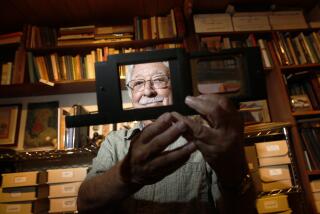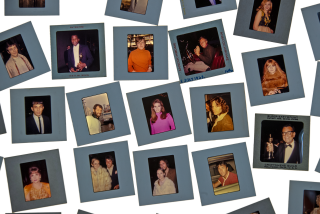* Enrique Alferez; Artist Rode With Villa
- Share via
Enrique Alferez, 98, New Orleans artist famous for his travels with Pancho Villa. At the age of 12, the Mexican-born Alferez began serving with the revolutionary forces led by Villa. He was featured in a PBS television special “American Experience: The Hunt for Pancho Villa,” as one of the last survivors of Villa’s army. After the Mexican Revolution, Alferez came to America and settled in New Orleans. He helped Tulane University scholars reproduce the Mayan Nunnery Quadrangle of Uxmal, Mexico, for display at the 1933 Chicago World’s Fair. More than 20 of Alferez’s Art Deco sculptures grace New Orleans City Park, and many others are scattered throughout that city and Mexico. The artist gained the most notice for the “Fountain of the Four Winds” sculpture that he created for the New Orleans Lakefront Airport in 1937, which included a well-endowed nude male. City officials ordered Alferez to chisel off the genitalia, but the artist refused. To ensure that no one desecrated his artwork, he stood guard with a rifle until Eleanor Roosevelt intervened to save the statue. Alferez continued sculpting into his 90s and five years ago was given New Orleans’ Lifetime Achievement Award. On Monday in New Orleans.
* David Karp; Prolific Novelist, TV Writer
David Karp, 77, novelist and television writer for such series as “The Untouchables.” Born in New York, Karp wrote from the time he was given a typewriter at 14. He served in the Army in the Pacific theater during World War II, put himself through college and churned out magazine articles, radio and television scripts, screenplays and novels. A pragmatist, Karp often said he could write anything to earn money but considered novels his most important contribution. In addition to paperbacks, which he wrote under the pseudonyms Adam Singer and Wallace Ware, he penned three critically acclaimed novels: “One” in 1953, “The Day of the Monkey” in 1955 and “All Honorable Men” in 1956. Karp’s works were compared favorably with those of George Orwell for their protests against totalitarianism. Karp also wrote and produced widely for television, from “Playhouse 90” in the 1950s to “The Untouchables” in the 1960s, “Archer” and “Quincy” in the 1970s, “The Mississippi” in the 1980s and several cable channel specials in the 1990s. Karp’s varied writings earned him a Guggenheim fellowship in creative writing, television’s Emmy, and an Edgar Award from the Mystery Writers of America. On Saturday in Pittsfield, Mass., of bladder cancer.
More to Read
The biggest entertainment stories
Get our big stories about Hollywood, film, television, music, arts, culture and more right in your inbox as soon as they publish.
You may occasionally receive promotional content from the Los Angeles Times.










